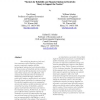Free Online Productivity Tools
i2Speak
i2Symbol
i2OCR
iTex2Img
iWeb2Print
iWeb2Shot
i2Type
iPdf2Split
iPdf2Merge
i2Bopomofo
i2Arabic
i2Style
i2Image
i2PDF
iLatex2Rtf
Sci2ools
118
click to vote
HICSS
2003
IEEE
2003
IEEE
Markets for Reliability and Financial Options in Electricity: Theory to Support the Practice
The underlying structure of why and how consumers value reliability of electric service is explored, together with the technological options and cost characteristics for the provision of reliability and the conditions under which market mechanisms can be used to match these values and costs efficiently. This analysis shows that the level of reliability of electricity provided through a network is a public good within a neighborhood, and unless planned demand reductions by customers have the identical negative value as an unexpected service interruption, market mechanisms will not reveal the true value of reliability. A public agency must determine that value and enforce the reliability criteria. Furthermore, in order to get an efficient level of demand response by customers in periods of system stress, they must see real time energy prices plus they must be paid an amount equal to the suppliers’ cost of adding reliability to the system, if that amount is not included in real time pr...
Biometrics | Consumers Value Reliability | HICSS 2003 | Real Time | Reliability Criteria | System Sciences |
| Added | 04 Jul 2010 |
| Updated | 04 Jul 2010 |
| Type | Conference |
| Year | 2003 |
| Where | HICSS |
| Authors | Timothy Mount, William Schulze, Richard E. Schuler |
Comments (0)

